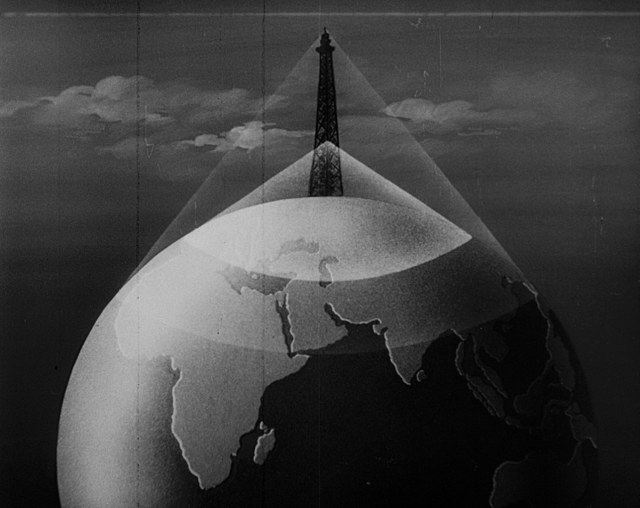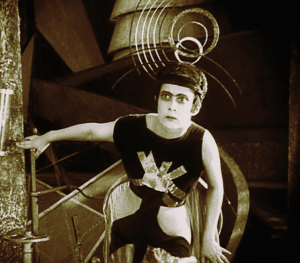

Dreams Rewired takes a look at how the anxieties that plague the modern era, have in fact been around for as long as technology has existed. A dreamlike film essay consisting of clips from early 20th century cinema, and haunting narration by Tilda Swinton, Dreams Rewired puts viewers under a trance that feels like waking up from the most intellectually satisfying dream of all time. Directed by Martin Reinhart, Manu Luksch and Thomas Tode, the film features newly found clips from dozens of films from the 30s and 20s, that often play out as strange manifestations of the most exuberant desires of a vanished time. We spoke to co-director Reinhart about bringing this dream to the screen, and how little, if at all, we have changed since the dawn of cinema.
I had to revisit the film because, very much like a dream, it left me quite dazzled!
(Laughs) It’s quite overwhelming the first time, isn’t it?
It is! But it’s also really beautiful. It’s appropriate that you gave the film that name because of its dreamlike quality. How were you and the co-directors able to achieve this?
The whole process of filmmaking was dreamlike. We had ideas, but we didn’t have the material, so we had to dream about what we would find. The dreamlike material that materialized in the archives was what made the film possible. We had a story, we found material we were looking for, some we weren’t expecting to find but which was too amazing not to include. The narration changed with every bit we added, it was like a game we couldn’t stop playing. We did research for over five years too, we didn’t just want European or American centric material, so we looked all over the world. The dreamlike aspect also has a lot to do with Tilda Swinton’s voice which is both general and sometimes very intimate, the perspective of the viewer isn’t clearly defined.
What material you discovered was the most surprising?
We systematically looked for “pre-television” images of television, or how motion pictures imagined television would be in the future. The discussion about television goes back to the 1890s when it was first patented, what we found out and didn’t expect, was that television wasn’t considered an entertainment medium, but surveillance technology. In many movies the villains had television sets to look at their victims. It wasn’t just in one film either, we saw many films doing the same which was terrifying. Also the theme of tapping telephones was very constant, from the moment the technology began, people were aware someone could listen to them and use what they said against them. There are whole series of movies based on the premise of tapping telephones. Most of the material we found you don’t see in the movie though.

Wow, are we ever gonna see that?
We have enough material to make three more.
I thought it was so fascinating you showed how important women were in early filmmaking and technology, not only in how phone operators literally kept the world communicated, but also learning about Alice Guy-Blaché, who was the first narrative director. It made me think of how during the Golden Age, women also worked as editors. In your research, would you say was it easy to determine if there were any social or political reasons that caused this shift from having women so involved in filmmaking, to having them become a minority within the industry?
Alice Guy was one of a kind, she was an exception. Sure there were many women involved as you say, they were editors, they also dyed early color film, but the fact that a woman would become a director was unusual in early cinema. We tried hard to oppose the general view of technology as a male domain, because it’s very evident from the material we found that women have always consumed technology, and participated in radio for example, not only as announcers or singers, but also as playwrights. There is a story yet to be written in media history that concentrates on the role of history, but we can’t deny the industry was always male dominated. If you’re looking for stories about women that haven’t been told, there is lots to find! People like Natalie Kalmus for instance, the wife of Technicolor founder Herbert T. Kalmus, who was an extremely important person in Hollywood, you couldn’t make a color film in the 1930s to 1960s without her being on the set. You could and should emphasize the role of women in the industry, but nevertheless it was male dominated, we wanted to tell these alternative stories for this reason.
The film is sort of putting to rest that idea that younger generations are always the one about to be zombified by technology. In fact you show that our neuroses have been the same for 150 years, we just have been expressing them through different gadgets. Do you feel the film serves as a bridge to connect older generations with modern ones?
I think that’s absolutely the point. It’s always the same sequence, you dream of the opportunities you have, then you have this idea of complete power, and then when this Utopian technology becomes a reality people feel powerless. When the internet was becoming publically accepted there these ideas about e-governments, and communities without borders, and then we woke up and found ourselves in our surveillance society. Looking at the history of radio communication for example, we see how in Germany the State was afraid of amateurs, so they regulated radio to stop them. It’s the same now with the internet, you want to give people private channels to communicate but the State feels uncomfortable with this. The rise of terrorism has given the State the right to tap private communication, in the end, like you say, the good thing is we can see it’s a conflict that’s been around forever, but it’s a conflict we can’t solve. We can fight for the rights of the individuals, but this is a complicated infrastructure.
When you were a kid, what movies or television shows did you think would most resemble the future?
The Jetsons! I remember lying on bed with my cousin and figuring out how old we would be in the year 2000, we couldn’t wait to have all these flying cars and miniature televisions on our wrists. We were completely disappointed by how the year 2000 looked like. Your question is pointing to something I would like to discuss which is how much I miss the clear Utopian quality that people had in the 20s and 30s, which we have lost. When we think about the future it’s only about how everything will be worse than now. This kind of dystopian idea of endless suffering began in the 1980s, in the 60s it was still clear that Rosie the Robot would procure breakfast.
Dreams Rewired is now playing at Film Forum.